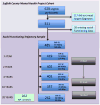The 20-Year Longitudinal Trajectories of Social Functioning in Individuals With Psychotic Disorders
- PMID: 27978770
- PMCID: PMC5474222
- DOI: 10.1176/appi.ajp.2016.15111419
The 20-Year Longitudinal Trajectories of Social Functioning in Individuals With Psychotic Disorders
Abstract
Objective: Social impairment is a long-recognized core feature of schizophrenia and is common in other psychotic disorders. Still, to date the long-term trajectories of social impairment in psychotic disorders have rarely been studied systematically.
Methods: Data came from the Suffolk County Mental Health Project, a 20-year prospective study of first-admission patients with psychotic disorders. A never-psychotic comparison group was also assessed. Latent class growth analysis was applied to longitudinal data on social functioning from 485 respondents with schizophrenia spectrum disorders and psychotic mood disorders, and associations of the empirically derived trajectories with premorbid social adjustment, diagnosis, and 20-year outcomes were examined.
Results: Four mostly stable trajectories of preserved (N=82; 59th percentile of comparison group sample distribution), moderately impaired (N=148; 17th percentile), severely impaired (N=181; 3rd percentile), and profoundly impaired (N=74; 1st percentile) functioning best described the 20-year course of social functioning across diagnoses. The outcome in the group with preserved functioning did not differ from that of never-psychotic individuals at 20 years, but the other groups functioned significantly worse. Differences among trajectories were already evident in childhood. The two most impaired trajectories started to diverge in early adolescence. Poorer social functioning trajectories were strongly associated with other real-world outcomes at 20 years. Multiple trajectories were represented within each disorder. However, more participants with schizophrenia spectrum disorders had impaired trajectories, and more with mood disorders had better functioning trajectories.
Conclusions: The results highlight substantial variability of social outcomes within diagnoses-albeit overall worse social outcomes in schizophrenia spectrum disorders-and show remarkably stable long-term impairments in social functioning after illness onset across all diagnoses.
Keywords: Mood Disorders-Bipolar; Mood Disorders-Unipolar; Outcome Studies; Psychosis; Schizophrenia; Social Functioning.
Figures


Comment in
-
Long-Term Outcomes of Psychosis: Naturalistic Follow-Up After Initial Hospitalization.Am J Psychiatry. 2017 Nov 1;174(11):1030-1031. doi: 10.1176/appi.ajp.2017.17080911. Am J Psychiatry. 2017. PMID: 29088932 No abstract available.
References
-
- Fett AK, Viechtbauer W, Dominguez MD, Penn DL, van Os J, Krabbendam L. The relationship between neurocognition and social cognition with functional outcomes in schizophrenia: a meta-analysis. Neurosci Biobehav Rev. 2011 Jan;35(3):573–588. - PubMed
-
- Green MF, Kern RS, Braff DL, Mintz J. Neurocognitive deficits and functional outcome in schizophrenia: are we measuring the “right stuff”? Schizophr Bull. 2000;26(1):119–136. - PubMed
-
- Harvey PD. Disability in schizophrenia: contributing factors and validated assessments. J Clin Psychiatry. 2014;75(1):15–20. - PubMed
-
- Charzynska K, Kucharska K, Mortimer A. Does employment promote the process of recovery from schizophrenia? A review of the existing evidence. Int J Occup Med Environ Health. 2015;28(3):407–418. - PubMed
Publication types
MeSH terms
Grants and funding
LinkOut - more resources
Full Text Sources
Other Literature Sources
Medical

